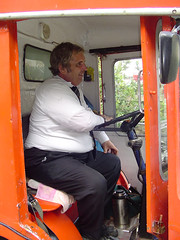 Cover via AmazonIs complaining an indicator of our graciousness and courtesy level? We're driving at that, you know!
Cover via AmazonIs complaining an indicator of our graciousness and courtesy level? We're driving at that, you know!-----
A complaint about complainers
Okay, I want to know who took American author Dan Buettner around when he visited Singapore. Whoever it was, the Singapore Tourism Board should hunt them and offer them a job.
They must have done one heck of a great job selling the Lion City to Buettner for him to conclude that it is the happiest place in Asia in his new book, Thrive, Finding Happiness The Blue Zones Way.
Yes, Singapore. Not even Bhutan, famously known for its Gross National Happiness index.
Buettner says Singapore has all it takes for happiness: Tolerance, status equality, security, trust, access to recreation and financial security.
He based his findings on interviews with Singaporeans from all walks of life - from Community Chest chairman Jennie Chua to housewife Noridah Yusoh.
I don't doubt that his interviewees told him they were happy. But are Singaporeans really happy people?
Just look at all those letters of complaint in the newspapers. Just take a peek at the posts in blogs and responses to online news. These are not exactly all sweetness and light, are they?
I remember once complimenting a store manager about how well her shop was run. She said: "Can you put it down in writing in our feedback slip?"
Apparently, if people were satisfied, they never bothered to fill the slip. But if something annoying were to happen, no matter how infinitely minor, you can be sure those feedback forms would be filled, even posted if necessary.
I think Singaporeans are never happy unless we have something to be unhappy about. Our slogan should be: We moan, therefore we bond.
Try asking a Singaporean: "So how's business/your children/your work/your family?"
The answer is invariably: "Okay lah, can be better."
Coffeeshop talk is never about how wonderful life is. It's always about how badly a chosen English Premiership team is doing, how much money one has lost playing 4D, how the "gahmen" should be doing this, that or the other ...
Nothing can make us happy. If property prices are low, we fret about going into negative equity and how we may never have enough money to retire on. If property price are high, we complain we can't buy a roof over our heads or can't afford that investment home.
If we have a job, we complain about how we're overworked and underpaid. But lose our jobs and we moan even louder.
We have security in the form of low crime rates but still whine that the police can do more. We have access to recreation but grumble that the facilities are not up to scratch.
Maybe it's because there's some superstitious Asian bit of us that never likes to admit how well things are going in case some malevolent spirits take notice and decide to cause mischief.
Or perhaps we, like Minister Mentor Lee Kuan Yew, are worried about being too happy because, as he told Buettner: "Then I would be complacent, flabby, and walk into the sunset."
Looking at the blurb for Thrive in Amazon.com, though, I think I have found why Singapore is considered the happiest place in Asia.
It states: "According to Buettner's advisory team, the average person can control about 40 per cent of his or her individual happiness by optimising life choices. They fall into three categories that make up the way we live our lives: The food we eat, the way we exercise, and the social networks we foster."
So simple. It's food.
I'm not sure about the exercise and social network bit but we've always enjoyed our food. For sure, finding the ultimate char kway teow or chicken rice puts me in a good mood for days.
Maybe life's happiness can really be as simple as that.
Tabitha Wang will see you at the kopitiam. You can complain about anything all you like as long as you buy her a fluffy prata telur bawang.
Taken from TODAYONline.com, Voices; source article is below:
A complaint about complainers






